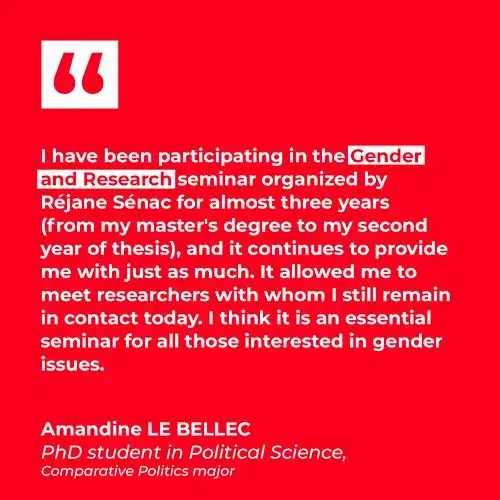
Home>Academics>Intensive research training
Intensive research training
Doctoral and masters students from different disciplines are encouraged to meet, to take the opportunity of short research training courses to learn from each other and to broaden their field of research. Inter-semester courses and seminars are offered outside the periods during which compulsory courses generally take place.
Course offering
The inter-semester courses can be :
- Methodological courses intro, intermediate or advanced level (such as courses in econometrics, archival research, in the legal field sequence analysis, legal hermeneutics, analytical methods for lawyer,
- Disciplinary and/or Specialization courses at either intro or very advanced level (electoral sociology, in the legal field, animal law, critical analysis of law, law and economics, mediation..) These courses expand on, without repeating, courses offered in the College. They serve also as a tool of interdisciplinary dialogue: a student who specializes in one discipline is able to pursue training in another one
- Professionalization course: the professional integration of PhD students is one of the priorities of the School of Research. Every year, the Sciences Po Research School organizes professionalization seminars as part of the inter-semester courses. PhD students are supported in the implementation of their first teaching in collaboration with the Institute of Skills and Innovation of Sciences Po, each doctoral student also receives training in research ethics and scientific integrity in the different fields, management of data ethics online, ethics and sensitive research fields abroad etc, in collaboration with the Media Center of the School of Journalism of Sciences po PhD students are trained to understand the functioning of the media and the codes of journalists, to learn fact checking techniques, to train to be interviewed, and manage stress during a live.
Period of teaching
Two intensive course periods are offered:
- Autumn/Winter (October to January)
- Spring/Summer (May to July)
Instructors
The inter-semester courses are taught by members of Sciences Po’s academic community and might also involve guest professors.
Syllabus
Inter-semester courses - Spring/Summer
Inter-semester courses - Autumn/Winter
For any questions or concerns please send us a message to:
Claire Rameau
Ph.: +33 (0)1 45 49 76 94
Office E 311 (3rd floor)
Genre et recherche

The Genre et recherche seminar, directed by Réjane Sénac, CNRS research director at the CEVIPOF-Sciences Po, is part of Sciences Po's gender studies programme. Its aim is to create a think-tank and research group around the work of doctoral students, as well as Master 1 and 2 students, who are explicitly involved in so-called gender studies or for whom the issue of equality policies is illuminating. The aim is for different disciplines to engage in dialogue around common themes or questions (methodological issues, identity and equality politics, the fight against discrimination, intersectionality, sexuality, politicisation, mobilisation, etc.).
Throughout the year, doctoral students are offered online courses on the France Université Numérique platform.
Discover the range of online courses.
To access the courses, you must first create an account on the platform using the registration form.

CIVICA is the European University of Social Sciences. It is one of the pilot European Universities selected by the European Commission in June 2019 under the Erasmus+ Programme.
The ten CIVICA partners are Bocconi, CEU, EUI, Hertie School, IE, LSE, Sciences Po, SGH, SNSPA, SSE.
CIVICA aims to prepare the next generation of global Europeans towards understanding and contributing to an increasingly complex world. Its main goal is to generate awareness and to share beneficial knowledge with academics, policy makers, and practitioners in order to provide constructive solutions to the transnational challenges faced by citizens worldwide.
CIVICA focuses on four domains of research and cooperation: challenges to democracy in the 21st Century; societies in transition and crises of earth; Europe revisited; and data driven technologies for the social sciences.
Through various existing and upcoming joint initiatives and opportunities, CIVICA enables doctoral fellows and researchers to exchange on ongoing research, team up for collaborative projects, and network with colleagues working on similar topics. CIVICA's offers at doctoral level also include an Early Stage Researcher course catalogue, summer schools, and methods and skills workshops.
Courses and seminars offered by CIVICA's partners
Some of these inter-semester courses and seminars are open to early stage researchers from CIVICA partner universities. Find out more about what doctoral and postdoctoral researchers say about CIVICA courses.
Testimonials
CIVICA Summer Schools
CIVICA Summer Schools offer doctoral researchers the opportunity to present their research to a variety of experts in social sciences, compare methodological approaches, and interact with peers from partner universities, who are working on related topics. Training sessions such as panels on publication strategies and writing research proposals are also offered during the CIVICA summer schools. The next summer school will be organized by SNSPA in Romania in 2025.
Previous summer schools have been hosted by EUI (2021; 2023) and Bocconi (2022).
- Challenges of Transnational Democracy, September 4-7, 2023; European University Institute, Florence.
- Reconstructing Europe after Crises, July 11-15, 2022, Lake Como
- European integration in historical and contemporary perspective. New approaches and findings, September 6-9, 2021, European University Institute, Florence.
Annual “Economy and Society” Summer Conference
For Graduate Students in Political Economy and Economic Sociology
Since 2006, a summer conference on “Economy and Society” brings together renowned scholars and graduate students in political economy, economic sociology and related fields from a network of partner institutions that now include Central European university, Max Planck Institute for the Study of Societies, Northwestern University, Sciences Po, Brown, Berkley.
The three-day conference is hosted on a rotation basis by one of the partners around an orienting theme, with the ambition to bring graduate students and senior scholars. As a result of this long-term cooperation, the joint summer conferences have become a nodal element in the institutional partnerships of its members, connected faculty members and young scholars on new projects and on-going research. They have been particularly precious for graduate student training, allowing young scholars from all universities to present their findings, confront a variety of standards and perspectives and make important international connections early on.
- Summer school 2024 “Political Economy and Economic Sociology”, June 23 to 26, 2024 - Sciences Po, Menton Campus.